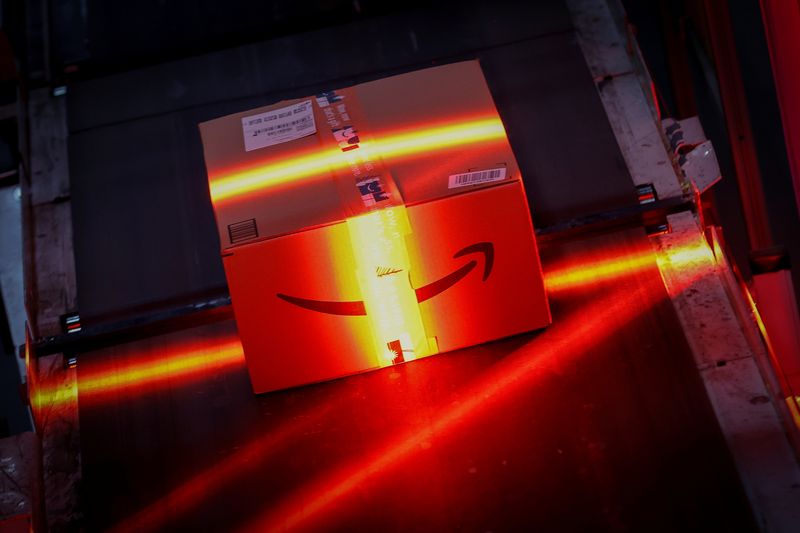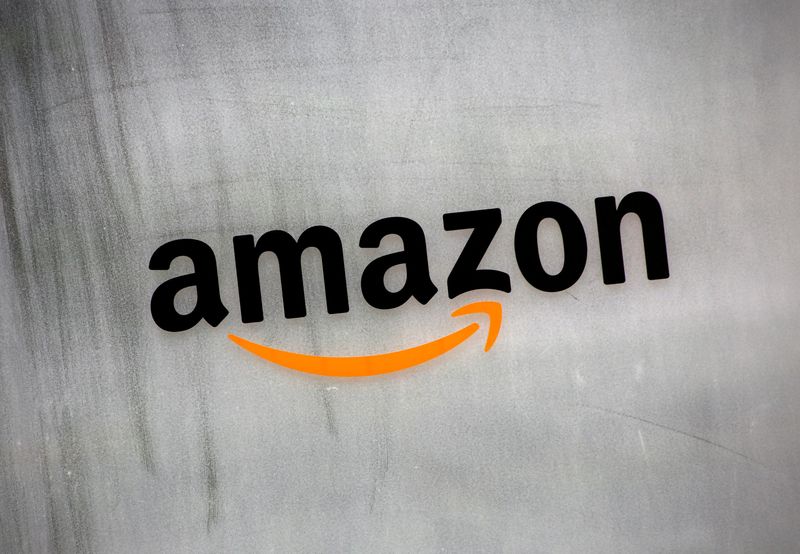By Greg Bensinger and Deborah Mary Sophia
(Reuters) -Amazon.com on Thursday posted third-quarter profit and sales above Wall Street estimates, helped by favorable retail sales, sending its shares up 5.7% after the closing bell.
The company indicated it expected healthy results in the holiday quarter, its largest of the year, thanks to its faster shipping times and a move to stock lower-costs items.
Amazon (NASDAQ:AMZN)'s upbeat results could signal a better-than-feared holiday season for retailers, who have been bracing for the slowest pace of holiday sales growth in six years.
Three months ago, Amazon executives warned that consumers were “cautious with their spending” and seeking less-expensive options.
Amazon reported a 7% improvement in retail sales in the quarter ended Sept. 30 to $61.41 billion. The after-hours gain in the share price more than made up for a decline during regular trading.
"The most notable item in Amazon’s earnings was the surprising improvement in margins," said Gil Luria, head of technology research at D.A. Davidson. "Investors were concerned about the ability of the retail business to maintain margins and Amazon was able to actually grow margins."
The operating margin for Amazon's international business jumped to 3.6% in the third quarter from 0.9% in the second quarter. The North America margin ticked up to 5.9% from 5.6% in the previous quarter.
The company faces heightened competition from discount retailers such as Shein and Temu, which sell a wide range of goods at bargain-basement prices sent directly from China.
Like its tech peers, Amazon said it expected higher capital expenditures for the foreseeable future to help develop artificial intelligence software. In a call with analysts, CEO Andy Jassy called AI "maybe once-in-a-lifetime type of opportunity" and that "we're aggressively pursuing it."
Capital expenditures are expected to rise to around $75 billion this year from $48.4 billion last year. Jassy said Amazon expects that will grow next year.
Amazon Web Services, the company's cloud business, reported a 19% increase in sales to $27.5 billion, in line with estimates, according to LSEG data. It was the quickest pace of growth in seven quarters for AWS, which accounts for a fifth of Amazon's overall sales but roughly two-thirds of its revenue.
"The black eye here was AWS," said Dave Wagner, portfolio manager at Aptus Capital Advisors that holds 360,000 shares of Amazon stock. While the 19% sales growth exceeded expectations, he said he believed the "whisper number was that it would be closer to 21 or 22%,"
AWS competes with Microsoft (NASDAQ:MSFT)'s Azure and Alphabet (NASDAQ:GOOGL)'s Google cloud, which both reported increases in quarterly cloud revenue this week.
D.A. Davidson's Luria said Google Cloud has taken some market share from AWS in the past two quarters.
Amazon, though, has snatched away some of Google's advertising business as it has become popular with advertisers looking to tap a ready pool of buyers on its website.
Amazon’s advertising sales rose 19% to $14.3 billion, narrowly exceeding expectations, thanks in part to Amazon advertising slots on shopping carts in brick-and-mortar stores and ads on its Prime Video streaming service.
The midpoint of Amazon's fourth-quarter revenue forecast - $185 billion - just missed an average analyst estimate of $186.16 billion. Luria said the company was being conservative about "what the holiday season is going to be, given the high level of variability around that."
Ahead of the earnings report, Amazon shares closed the trading session down 3.3%. The shares had risen almost 23% this year, beating a nearly 20% jump in the broader market.
Seattle-based Amazon said sales in its North America segment rose 9% to $95.5 billion in the third quarter. Total revenue was $158.9 billion, compared with analysts' average estimate of $157.20 billion.
Net income was $15.3 billion, up 55% from 2023's $9.9 billion. Amazon reported earnings of $1.43 per share, beating expectations of $1.14 per share.

Jassy has been cutting jobs over the past year and will implement a controversial five-day-per-week in-office policy starting in January. That has generated some backlash from employees including from more than 500 who yesterday sent a letter to AWS' CEO protesting the change.
Amazon halted a practice dating back at least 23 years of holding a separate conference call with its chief financial officer and reporters, decreasing transparency.
